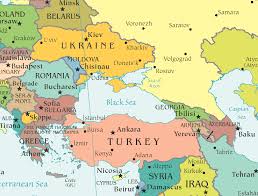 YUNUS PAKSOY@yunuspaksoy ISTANBUL Published January 18, 2017
YUNUS PAKSOY@yunuspaksoy ISTANBUL Published January 18, 2017
Turkey and Russia stand out among the member states. Having improved relations following a downed Russian jet crisis in November 2015, Ankara and the Kremlin have been showing signs of strong collaboration both in diplomacy and the area of the economy.
Drawing attention to the recent rapprochement between Turkey and Russia, Yıldız said that the cooperation of the two countries in several areas will definitely benefit the BSEC. “Our relations will affect the organization positively. After a short period of tense relations, the relations are where they are supposed to be right now,” the deputy foreign minister said.During its term, Turkey will support the ongoing efforts to establish a Regional Trade Facilitation Strategy for the BSEC region.
President Recep Tayyip Erdoğan and Russian President Vladimir Putin have already reiterated that the normalization of Turkish-Russian ties will further continue. Regarding the issue, the deputy foreign minister said that the ties could be further bettered with a high level cooperation meeting in the near future.
While economic trade relations remain strong between Turkey and Russia, sanctions on over 80 companies have been recently lifted.
Restrictions were initially lifted for 30 companies operating in Russia, and now, the number of firms for which restrictions have been removed subsequently reached 50 and 80, an official told Daily Sabah, pointing out that the ban on five of 18 agricultural products by Russia was lifted and that an opening could be made in this field.
Turkey argues that the Turkish-Russian thaw could galvanize the BSEC. While there are intra-organizational conflicts, the BSEC needs more dialogue and collaboration. In addition, the Turkish chairmanship will support enhancing collaboration in the field of tourism in the Black Sea region.
Recently, Foreign Minister Mevlüt Çavuşoğlu co-penned an op-ed article for Daily Sabah. In the article, Çavuşoğlu said: “Today, the wider Black Sea region faces a number of political, economic and security challenges. These interrelated problems can only be effectively addressed through increased interaction, enhanced coordination, constructive dialogue and focused and result-oriented cooperation.”
The BSEC will hold a summit in June in Istanbul to celebrate the 25th anniversary of the organization.
Ankara has had several disputes with the European Union for a while. Furthermore, President Erdoğan suggested that Turkey could end its full membership bid. While Turkish-EU relations turned sour, the BSEC surfaced as an alternative.
The BSEC spans over 20 million square kilometers and has a population of 330 million people in its 12 member countries. For the time being, the BSEC is not as preferable as the EU in terms of its economic size, but has succeeded in developing an effective structure similar to the EU model for about 25 years since its establishment.
While it remains a question whether Turkish-Russian efforts will be enough to bring new life into the BSEC or whether the organization could prove to be an alternative for Turkey, the organization offers a glimpse of what could be more cooperation and success in the Black Sea region.
http://www.dailysabah.com/economy/2017/01/18/turkish-russian-thaw-to-galvanize-black-sea-region



